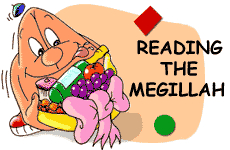 Identifying as a Jew
Identifying as a Jew


5 min read
The laws of reading the book of Esther twice on Purim.
A person is obligated to hear the reading of the Megillah ― once at night and again the next day. (Shulchan Aruch - Code of Jewish Law 687:1)
1) Men, women, and children (who have reached the age of education ― age 6) are required to hear the Megillah.
2) The Megillah is so important that even Torah study is deferred to hear the reading.
3) The Megillah is read twice ― first at night, and again the next day. The time for the night reading is from nightfall (Tzait Hakochavim) until dawn (Alot Hashachar). Some authorities permit, even in the case of a mild illness, to read the Megillah one-and-a-quarter hours before nightfall.
4) The time for the daytime reading is from sunrise to sunset. Post facto, the daytime reading may be read even after sunset (as long as the reading is concluded before nightfall), though the blessings may not be recited.
5) Because of the concept of B'rov Am Hadrat Melech ― "with the multitude of the nation is the King honored" (Proverbs 14:28) ― it is preferable to hear the Megillah at a synagogue with a large number of people. If, however, it is difficult to properly hear the Megillah because of the crowd, it is preferable to attend a smaller synagogue.
6) Immediately before the blessings are recited, an announcement should be made that the reader has in mind to fulfill the congregation's obligation, and likewise they should have in mind to have their obligation fulfilled.
7) Those listening to the Megillah can sit throughout. Though when read in public, the Baal Koreh (person actually reading the Megillah) must be standing. In private, the Baal Koreh may read either standing or sitting.
8) The Megillah, which is called an "Iggeret" (a letter), is folded open before being read.
9) We say three blessings before reading:
If a woman reads the Megillah, she should say as the first blessing, "Lishmo'ah Mikrah Megillah." The blessings should be said standing, even when reading for an individual. If one accidentally omitted the blessings, he has still fulfilled his obligation to hear Megillah.
10) When the "Sheh-hecheyanu" blessing is said in the daytime, one should have in mind that it includes the mitzvot of Matanot La'evyonim, Mishloach Manot, and the Purim meal.
11) The entire Megillah must be read from a kosher scroll, written with proper ink, parchment, markings (sirtut), etc. One who recites the Megillah by heart has not fulfilled his obligation.
12) The custom is to make noise at the mention of Haman's name, to comply with the command to wipe out the remembrance of Amalek (Deut. 25:17-19). Parents should be careful that children do not make so much noise that others are unable to properly hear the Megillah reading.
13) If at all possible, every word of the reading should be from a kosher Megillah. Therefore, the reader should wait for the noise to subside after reading Haman's name before continuing.
14) Their are four verses of redemption, which the congregation traditionally reads aloud: Ish Yehudi, Mordechai yatza, LaYehudim haysa ora, and Ki Mordechai HaYehudi. Since every word of the reading should be from a kosher Megillah, the reader must repeat these verses after the congregation.
15) Where possible, it is preferable for those listening to have their own kosher Megillah to follow from (Pri Megadim).
16) Unless one is following from a kosher Megillah, he may not read along with the reader, but should listen quietly and follow in a printed book. Of course, it is forbidden to speak during the reading.
17) Post facto, if a word or sentence is not heard, it may be read from a printed book or said by heart.
18) The Talmud says that the names of all 10 sons of Haman (and the following word, aseres) should be read audibly in one breath. The custom is also to include 500 ish in the one breath, if possible. According to the Rogachaver Gaon (19th century Europe), each individual should read this verse in one breath, since the Baal Koreh cannot fulfill others' requirement of "one breath."
19) Some have the custom that four of the phrases in which God's name is hidden are read on a higher key and emphasized. They are: levado avsa Vashti hamalka (1:16), he, vechol hanashim yitnu (1:20), yavo hamelech vahaman hayom (5:4), and ze aynenu shoveh li (5:13).
20) When the reader reaches the verse Nad'da shnas hamelech ("and the King's sleep was interrupted" ― 6:1), he should raise his voice, since this forms the essence of the miracle. The reader should raise his voice as well for verse 2:17, since this was the catalyst for the miracle.
21) The following verses should be read with the tune of Eicha (rather than the normal tune for Esther), to signify the sad or tragic implications of these verses: 2:6, 3:15, 4:1, the last half of 4:3, and 7:4.
22) Some have the custom to shake the Megillah when saying the words ha-iggeres hazos ("this letter").
23) After the Megillah reading, we say the blessing Harav es riveinu, thanking God for saving us. This blessing should be said only with a minyan. (If there is no minyan, it may be said without God's name.) After the night reading, we also say V'Ata Kadosh, Aleynu, "Kaddish," and Shoshanas Yaakov. On Saturday night, we also say Vee-hee Noam.
24) Someone who will be on a voyage, and will not have a Megillah available, may read as early as the 11th of Adar (and some say even from Rosh Chodesh Adar).
